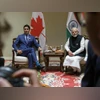In a development that could signal an improvement in diplomatic relations between India and Canada, Canada’s Deputy Foreign Minister David Morrison has expressed support for India’s territorial integrity. Speaking at a public hearing of the Canadian Foreign Interference Commission in Ottawa on October 4, Morrison made it clear that “there is one India” and the country’s sovereignty must be respected. His remarks, broadcast on the nation’s parliamentary channel, come at a time of heightened tensions following the assassination of Khalistani separatist Hardeep Singh Nijjar last year.
“Canada’s policy is very clear that India’s territorial integrity must be respected. There’s one India, and that’s been made very clear,” Morrison said, while addressing a concern raised by India over the Khalistani movement, which has seen support from some Canadian citizens. He also acknowledged the existence of Khalistan advocates in Canada but reiterated Ottawa’s recognition of India’s unified sovereignty.
The statement marks a key clarification of Canada’s stance in light of the diplomatic rift that escalated after Canadian Prime Minister Justin Trudeau suggested in September 2023 that Indian agents were potentially involved in Nijjar’s killing. India has firmly denied these accusations, calling them ‘absurd’ and ‘politically motivated’, while also expressing concerns about Canada’s leniency towards pro-Khalistan groups.
Morrison also highlighted the longstanding partnership between India and Canada, noting that ties had been improving until the Nijjar assassination strained relations. He pointed out that both countries were in talks for a foreign trade agreement and witnessed a positive engagement during the G20 Summit in September 2023. However, the fallout from Nijjar’s death led to the expulsion of 41 diplomats, pushing relations into what Morrison described as a “complicated place.”
Despite this, Morrison said communication channels between the two nations remain open. “Canada and India are partners going back many decades. India is an increasingly significant global player, and Canada is taking account of that in its policies,” he said, hinting at a possible path forward in resolving the diplomatic impasse.
The tension surrounding Nijjar’s killing has left both nations grappling with unresolved security concerns. Trudeau, after the Lok Sabha elections in June this year, expressed a desire to resume talks with India on critical issues, including national security and rule of law.
More From This Section
In June 2023, the Canadian Parliament observed a moment of silence in Nijjar’s memory, while India held a memorial service in Vancouver, commemorating the victims of the 1985 Air India bombing by Khalistani terrorists. The tragic history of the Khalistan movement continues to loom large over Indo-Canadian relations, with both countries navigating the complexities of managing internal and external threats.
The ongoing public inquiry into foreign interference in Canada’s electoral processes, established on September 7, 2023, further highlights the complexity of the situation. With a focus on countries like India, China, and Russia, the inquiry’s final report is expected by December 31, 2024, potentially influencing future diplomatic and security policies between the two nations.

)